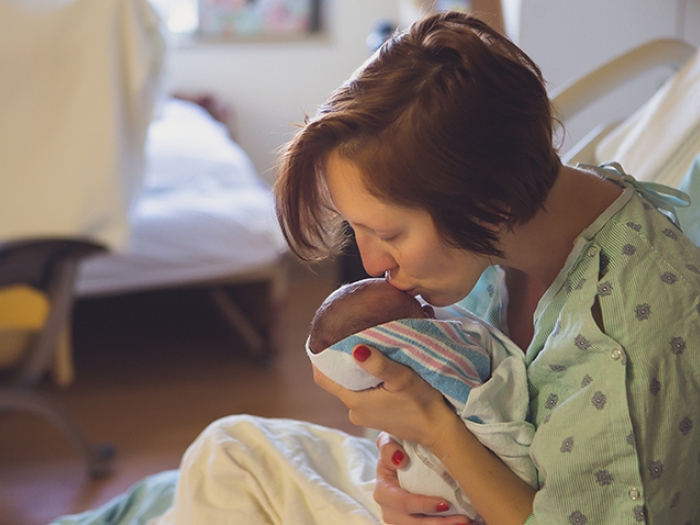Losing a baby to miscarriage or shortly after childbirth is a unique, unfamiliar and heartbreaking type of grief. How to foster support and healing.
1:00 PM
Author |

This article was updated on October 15, 2020.
For parents who've experienced miscarriage, stillbirth, or infant loss, the grief can be debilitating.
"Many women and partners who have had these devastating losses feel isolated," says Margaret (Maggie) Mieras, LMSW, a clinical social worker at Michigan Medicine's Briarwood Center for Women, Children, and Young Adults. "Sometimes loved ones don't know what to do or say to give them comfort. Which means they might not say anything."
Grief and emotions associated with the loss can be triggered when a parent sees other children in public, when they have a friend or family member who is pregnant, or when they approach their expected due date or the anniversary of the loss of their baby.
Couples may also experience more conflict because of different coping and communication styles.
Daily stressors in life and relationships may compound the effects of grief and increase the emotional pain that parents feel. The COVID-19 pandemic further isolates many parents from their supports, and limits availability of strategies for coping with grief.
This is why Mieras says seeking help to manage grief, especially now, is so important.
A different kind of grief
"The death of a newborn is not the same as the death of an adult where you have decades of shared memories," Mieras says. "This is a loss of dreams and expectations for the future."
It's also a loss that friends and family may not acknowledge in the same way as with an adult. Often, there may have been initial support, but that changes as time passes.
Mieras also notes that there's a misconception that the five generalized stages of grief — denial, anger, bargaining, depression, and acceptance — are universal.
"Although some people experience all of those stages, others don't. Grieving is an individual experience, and there is no right way to grieve," she says. "Processing grief depends on someone's coping style, personality, life experiences, the significance of the loss, a person's faith, and other factors."
Finding healing
Mieras suggests that a trained professional can be particularly helpful in the healing journey.
"A professional will have experience supporting different types of grief and can help find ways for you and your partner to heal based on your own unique circumstances and personalities." Most perinatal mental health professionals are providing therapy virtually at this time.
Different types of support may be more appropriate for different individuals. Support groups can also be therapeutic for many parents. As such, Michigan Medicine offers a monthly support group for anyone affected by miscarriage, stillbirth, early infant death, or other loss.
"For some people, private therapy can be intimidating. For others, coming to a support group very quickly after a loss can be emotionally overloading. Others may need to process their grief privately. The most important thing is to understand that there is help out there to support you when you're ready," says Mieras, who also facilitates the Michigan Medicine support group.
Obstetricians can often recommend support groups or professional therapists skilled in perinatal or reproductive loss.
Supporting loved ones
Mieras offers additional suggestions for friends and family of those coping with pregnancy or infant loss:
Reach out. Even if you aren't sure what to say, connect with your loved ones. It's OK for family and friends to admit that they don't know what to say to the grieving woman or couple. Mieras says, "Tell them that you're sorry for their loss, or say the words 'I don't know what to say.'"
She suggests, however, avoiding clichés.
"Using some common phrases such as 'everything happens for a reason' may be comforting for some families, but more often it is not comforting to the parents," she says. "The loss is heartbreaking, and often there is no reason or explanation."
Take their lead in acknowledging the loss. Parents may prefer to acknowledge their baby in private or public ways. It is best for family and friends to respect the woman's or couple's wishes and acknowledge their loss as they do.
Every October, Michigan Medicine offers an annual Walk to Remember and Tree-Planting Ceremony for families to gather and remember pregnancies and babies they have lost.
"It's a beautiful and respectful commemoration. For many families, this type of opportunity can be very healing," notes Mieras.
Make your support known. As people grieve, let them know that you want to provide support. Ask them what they need. Volunteer to bring meals, watch their other children, or just go for a walk together. Parents may not be able to grieve or share with family and friends at certain times. It's also okay to give them time and space, says Mieras.
Additional resources:

Explore a variety of health care news & stories by visiting the Health Lab home page for more articles.

Department of Communication at Michigan Medicine
Want top health & research news weekly? Sign up for Health Lab’s newsletters today!





